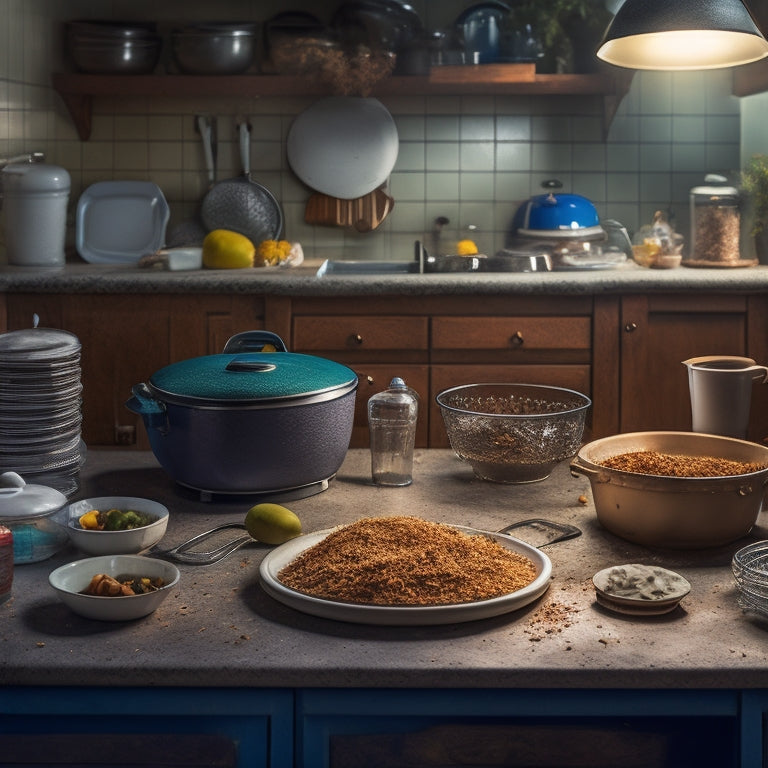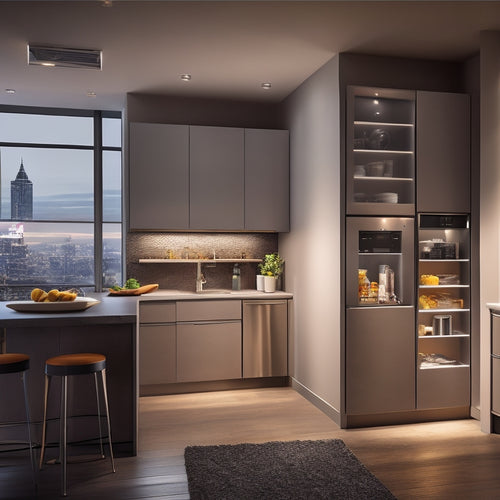
Why Cluttered Countertops Are Holding You Back
Share
You're likely unaware of the profound impact cluttered countertops have on your daily life, from draining your energy and eroding your focus to silently stealing valuable time and hindering your productivity. Cluttered countertops lead to feelings of suffocation, increased stress, and anxiety, making it difficult to relax and unwind. They also waste your precious time, causing you to re-do tasks and make duplicate purchases. Worse, they can even lead to social embarrassment and financial costs. By clearing the clutter, you can break free from these hidden consequences and reveal a more efficient, productive, and peaceful you - the journey starts now.
Key Takeaways
• Cluttered countertops drain energy, erode focus, and steal valuable time from daily routines, impacting productivity and mental well-being.
• Visual overload from cluttered countertops can lead to feelings of suffocation, increased stress, and compromised creation of mindful spaces.
• Cluttered countertops result in wasted time and resources, with duplicate purchases, food waste, and inefficient resource allocation being common consequences.
• A cluttered kitchen can lead to social embarrassment, dining anxiety, and self-consciousness, affecting relationships and overall quality of life.
• Implementing organizational strategies like visual pathways, traffic flow, and storage accessibility can help declutter countertops, enhance productivity, and promote a sense of calm.
Clutter's Hidden Consequences Revealed
Every day, cluttered countertops silently drain your energy, erode your focus, and steal valuable time from your daily routine. You mightn't even realize it, but the clutter is affecting you on a deeper level. It's not just about the physical space; it's about the mental toll it takes on you.
Cluttered countertops lead to an energy drain, making you feel sluggish and unmotivated. You'll find yourself struggling to get things done, and before you know it, the day is gone.
Moreover, clutter contributes to brain fog, making it difficult for you to think clearly and make decisions. You'll feel overwhelmed, and your productivity will suffer.
The constant visual stimuli from the clutter will keep your brain in a state of hyperarousal, making it hard to relax and unwind. By clearing your countertops, you can break free from the hidden consequences of clutter and regain control over your daily life.
It's time to take back your energy, focus, and time.
Countertop Chaos Affects Mental Health
As you struggle to stay focused and motivated amidst the clutter, it's likely you're unaware of the profound impact countertop chaos has on your mental wellbeing. The constant visual overload can lead to feelings of anxiety, overwhelm, and even depression. A cluttered countertop can make you feel like you're drowning in a sea of disorganization, making it difficult to relax and unwind.
Here are just a few ways countertop chaos affects your mental health:
-
Feeling suffocated: Cluttered countertops can make you feel trapped and suffocated, like there's no escape from the mess.
-
Lack of control: When your countertops are cluttered, you may feel like you've lost control over your environment and your life.
-
Increased stress: Visual overload can trigger stress responses in the brain, making it harder to cope with daily tasks.
- Mindful spaces compromised: Cluttered countertops can compromise your ability to create mindful spaces that promote relaxation and calmness.
Lost Productivity and Wasted Time
With cluttered countertops dominating your kitchen, you're likely sacrificing precious time and energy searching for misplaced items, re-doing tasks, and tackling avoidable complications that could've been prevented with a more organized space. This lack of organization hinders your ability to manage your time effectively, leading to wasted hours and decreased productivity.
When you can't find what you need, you're forced to spend more time searching, re-doing, and re-thinking, rather than focusing on high-priority tasks.
Effective time management is key to achieving your goals, and cluttered countertops are a major obstacle to achieving this. By prioritizing tasks and organizing your space, you can streamline your workflow, reduce stress, and increase your overall efficiency.
With a clear and organized kitchen, you can focus on cooking, creating, and enjoying quality time with loved ones, rather than wasting time searching for lost items or dealing with avoidable complications.
The Financial Cost of Clutter
You're not only wasting time and energy on cluttered countertops, but you're also throwing money out the window, literally and figuratively, as disorganization leads to unnecessary purchases, expired or spoiled food, and inefficient use of resources.
Cluttered countertops are a financial drain, and it's essential to recognize the hidden expenses and opportunity costs associated with them.
Here are just a few examples of how clutter is costing you:
-
Duplicate purchases: Buying items you already have but can't find, resulting in unnecessary expenses.
-
Food waste: Expired or spoiled food going to waste due to poor storage and organization.
-
Inefficient resource allocation: Spending money on storage solutions or cleaning products to compensate for clutter, rather than addressing the root issue.
- Missed savings: Failing to take advantage of sales or discounts because you can't find what you need or don't have the space to store it.
Cluttered Countertops and Social Embarrassment
Cluttered countertops can make you feel self-conscious about inviting friends over, fearing they'll judge your disorganized space and perceive you as lazy or overwhelmed. This anxiety can lead to Dining Anxiety, where you dread hosting dinner parties or casual gatherings, worried that your cluttered kitchen will be the main topic of conversation.
You may find yourself constantly apologizing for the mess or making excuses for not having enough space to accommodate your guests.
Guest Tension is another consequence of cluttered countertops. When friends do come over, you might feel uneasy about them seeing your kitchen in disarray. You may try to usher them quickly into the living room or outside, avoiding the kitchen altogether. This tension can make socializing in your own home feel awkward and stressful.
Breaking Free From Kitchen Clutter
To break free from kitchen clutter, you need to take control of your countertops by:
- Clearing the clutter
- Decluttering your daily habits
- Creating a flow that works for you.
By tackling these key areas, you'll be able to transform your kitchen from a source of stress to a haven of efficiency.
Start by:
- Identifying the clutter hotspots and habits that are holding you back
- Get ready to make a change.
Clear the Clutter
Imagine this:
Breaking free from kitchen clutter begins with a ruthless purge of countertops, where every item is scrutinized and justified to earn its right to stay. This is your chance to adopt a minimalist mindset and start fresh. It's time to get real about what you need and what's just taking up space.
As you clear the clutter, envision the sense of freedom and calm that comes with a streamlined kitchen.
Visualize this:
- A clean and empty countertop, devoid of appliances and gadgets you never use
- A designated spot for everything, making meal prep a breeze
- A reduction in stress and anxiety, thanks to the elimination of visual clutter
- A renewed sense of control and confidence in your kitchen, where you can focus on cooking and enjoying quality time with loved ones
Declutter Daily Habits
Your daily habits are likely perpetuating the clutter on your countertops, making it essential to identify and adjust the routines that contribute to the chaos. Take a closer look at your morning routine, for instance. Are you leaving dirty dishes or coffee cups out, thinking you'll get to them later? Do you tend to dump your purse or backpack on the counter, adding to the clutter? It's time to break these habits.
Start by implementing a habit tracking system to monitor your daily routines. Write down every time you use the kitchen counter and what you're doing there. This will help you pinpoint areas where you can make adjustments.
For example, you might realize that you're leaving your lunch containers out because you're in a rush in the morning. Solution: prep your lunch the night before or set a reminder to clean up as soon as you're done eating. By becoming more mindful of your daily habits and making small changes, you can prevent clutter from building up on your countertops.
Create a Flow
You've taken the first step in reclaiming your countertops by identifying and adjusting your daily habits, and now it's time to think about the overall flow of your kitchen to guarantee everything has a designated place. A well-designed kitchen flow guarantees that you can move efficiently and safely while cooking.
To create a flow that works for you, consider the following key elements:
-
Work Zones: Divide your kitchen into zones dedicated to specific tasks, such as food prep, cooking, and cleaning. This will help you stay focused and avoid clutter buildup.
-
Visual Pathways: Create clear visual pathways by positioning frequently used items in easy-to-reach locations, reducing the need to navigate through cluttered areas.
-
Traffic Flow: Plan the traffic flow in your kitchen to avoid bottlenecks and collisions. Consider the 'work triangle' concept, where your sink, stove, and refrigerator form the points of a triangle to minimize walking distances.
- Storage Accessibility: Ensure that storage spaces are easily accessible and convenient to use, encouraging you to put things back in their place after use.
Frequently Asked Questions
Can a Cluttered Countertop Affect My Relationships With Family and Friends?
You unintentionally create social dynamics that trigger feelings of anxiety or guilt in others when you invite them into your cluttered space, which can lead to strained relationships due to emotional triggers like frustration or disappointment.
How Do I Handle Clutter From Family Members Who Don't Want to Change?
When dealing with family members' clutter, you set boundaries by communicating your concerns respectfully, while avoiding blame. Establishing clear expectations and involving them in the decluttering process helps maintain healthy family dynamics.
Are There Any Clutter-Reducing Products That Actually Work?
"It's no coincidence you're searching for clutter-reducing products - you're craving control! You'll love Spacious Shelves that maximize vertical space and Smart Containers that keep items hidden, giving you a sense of calm and clarity in your newly organized space."
Can I Declutter My Kitchen on a Very Limited Budget?
You can declutter your kitchen on a very limited budget by exploring frugal fixes like repurposing containers, utilizing vertical space, and DIY organizers, which lead to budget breakthroughs that create a safer, more efficient cooking environment.
How Often Should I Declutter My Kitchen to Maintain Organization?
You'll maintain your kitchen's organization by establishing daily habits, like wiping down counters and putting away dishes, and setting a weekly maintenance schedule to tackle deeper cleaning and clutter control tasks.
Related Posts
-

Revolutionize Your Kitchen With Smart Storage Solutions
You're about to reveal the secret to a kitchen that's both stunning and super functional. By incorporating smart stor...
